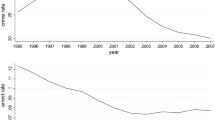Abstract
In this manuscript, the author argues that, starting from the Allingham and Sandmo (1972) and Yitzhaki (1974) frameworks, the traditional models of tax avoidance have paid little attention to the problem of minimising the audit cost faced by the tax administration in assessing the fairness of the taxpayers. The aim of this paper is just to provide new insights on how to efficiently tackle the phenomenon of tax avoidance, addressing the asymmetric information issue and accounting for the expected audit cost borne by tax administration. To accomplish this task, the author proposes a new Costly State Verification model of tax avoidance relying on a few weak assumptions. The solutions of the model suggest that, in equilibrium, the taxpayer’s probability of tax avoidance and level of compliance are constant with respect to both endogenous and exogenous variables, while the tax administration’s audit probability and fine dramatically depend on the taxpayer’s income, tax rate and effective audit cost. The obtained results also give interesting indications on the well-known Yitzhaki puzzle which are in contrast with the established literature on the Prospect theory.


Similar content being viewed by others
Data availability
This manuscript includes no data.
Change history
24 December 2022
This article has been updated in the abstract section. Figures and tables have been placed correctly in the online version.
References
Allingham MG, Sandmo A (1972) Income tax evasion: a theoretical analysis. J Public Econ 1(3–4):323–338
Arcand JL, Graziosi GR (2005) Tax compliance and rank dependent expected utility. Geneva Risk Insur Rev 30(1):57–69
Dell’Anno R (2009) Tax evasion, tax morale, and policy maker’s effectiveness. J Socio-Econ 38(6):988–997
Dhani S, Al-nowaihi A (2007) Why do people pay taxes? Prospect theory versus expected utility theory. J Econ Behav Org 64(1):171–192
Durham Y, Manly TS, Ritsema C (2014) The effects of income source, context and income level on tax compliance decisions in a dynamic experiment. J Econ Psychol 40:220–233
Holmstrom B, Tirole B (1997) Financial intermediation, loanable funds and the real sector. Q J Econ 112(3):663–691
Piolatto A, Rablen MD (2017) Prospect theory and tax evasion: a reconsideration of the Yitzhaki puzzle. Theory Decis 82(4):543–565
Reinganum JF, Wilde LL (1986) Equilibrium verification and reporting policies in a model of tax compliance. Int Econ Rev 27(3):739–760
Townsend RM (1979) Optimal contracts and competitive markets with costly state verification. J Econ Theory 21(2):265–293
Yitzhaki S (1974) A note on “Income tax evasion: a theoretical analysis.” J Public Econ 3(2):201–202
Acknowledgements
The author acknowledges the Associate editor and the anonymous peer reviewers who dealt with this manuscript.
Funding
The author has received no grants or financing for this research.
Author information
Authors and Affiliations
Contributions
The author has written the entire manuscript completely by himself and without using third-party material.
Corresponding author
Ethics declarations
Conflict of interest
The author is an Editorial Board member of SN Business and Economics. The author has no non-financial interests.
Ethical approval
This manuscript does not involve human or animal participants.
Consent for publication
The author consents to the publication of this manuscript in SN Business and Economics.
Supplementary Information
Below is the link to the electronic supplementary material.
Rights and permissions
Springer Nature or its licensor (e.g. a society or other partner) holds exclusive rights to this article under a publishing agreement with the author(s) or other rightsholder(s); author self-archiving of the accepted manuscript version of this article is solely governed by the terms of such publishing agreement and applicable law.
About this article
Cite this article
Vota, L. Efficient monitoring of tax avoidance: a Costly State Verification model. SN Bus Econ 2, 193 (2022). https://doi.org/10.1007/s43546-022-00364-6
Received:
Accepted:
Published:
DOI: https://doi.org/10.1007/s43546-022-00364-6




